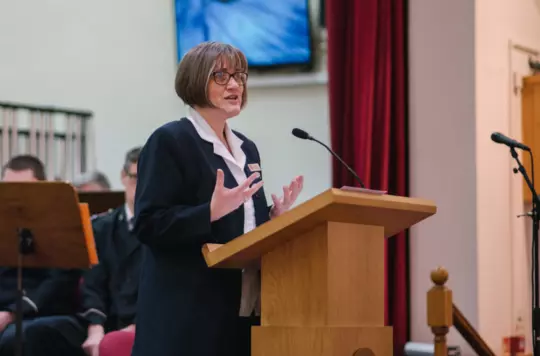13 February 2023
Acts 17: Can we prove who Jesus is? Or are we opening a can of worms?
Major Nigel Bovey
Major Nigel Bovey examines Paul’s approach to sharing the gospel.
Key text
Live worms – for the manufacture of compost or for use as fish bait – come in biodegradable cartons. Opening a can of worms, therefore, is strictly metaphorical – and Paul is not averse to prising open the occasional contentious lid.
The can of worms Paul opens in Acts 17 is the expectations of the Messiah. He starts with ‘explaining and proving that the Messiah had to suffer and rise from the dead’ (v3). This is a frustratingly rare venture. For, while Paul spends three days in Thessalonica doing so, he does not write three verses on the topic.
Paul has arrived in Thessalonica and – ‘as was his custom’ (v2) – he worships at the synagogue. While this verse describes Paul’s practice, little in Scripture betrays his personality. Some of Paul’s attitudes – towards women in church (see 1 Corinthians 14:34), gay people in the Kingdom (see 1 Corinthians 6:9) and slaves in society (see Ephesians 6:9), for example – are hard for many believers to accept 2,000 years later. However, the fact that he is allowed to speak on ‘three Sabbaths’ suggests that he must have had some measure of winsomeness about him.
Before looking at his message, let’s examine his method: ‘He reasoned with them from the Scriptures’ (v2).
The Greek word for ‘reasoned’, dialegomai, indicates dialogue. It does not mean monologue. Paul was as prepared to listen to others’ opinions as he was to give his own. Reasoning is not ranting. Reasoning requires being reasonable.
Pause and reflect
- When talking to other people about God, how reasonable are we?
- To what extent, do we need to be more winsome so that we can win some for Jesus?
Paul then sets about ‘explaining’ (v3). In the King James Version, the word used is ‘opening’. The word ‘opening’ suggests not an opening statement but an ‘opening of the body’ – a dissection of the Scripture. From this holy body of work, Paul extracts and exposes the vital truths about Jesus. By so doing, he hopes to open his hearers’ minds and hearts to the reality of Jesus.
Paul then goes about ‘proving’ (v3). The Greek word used for ‘proving’ – paratithemi – literally means ‘beside (para) place (tithemi)’. Effectively, Paul makes a statement about Jesus and then supports it by quoting relevant Scripture.
Pause and reflect
- How much better do you need to know what the Bible says about Jesus?
Verse 3 identifies Paul’s threefold message: ‘the Messiah had to suffer’, the Messiah had to ‘rise from the dead’, and Jesus ‘is the Messiah’.
In his letters, Paul mentions ‘Christ’ nearly 400 times. He writes about Jesus in relation to the Law. He talks about Christ’s role in the future but he never does on papyrus what he does in Thessalonica. He uses ‘Christ’ as a name and never, as Peter does, as ‘the Christ’ (Matthew 16:16 KJV). Surprisingly for a scholar, there is no recorded systematic exposition of Jesus as the Messiah in the way that fisherman Peter lays out at Pentecost (see Acts 2:2–36).
In my book Keys of the Kingdom, I identify four main expectations of the Messiah prevalent at the time of Jesus. The Sadducees do not expect a messiah. The ascetic Essenes believe they will co-lead an uncontaminated Kingdom with the Messiah. The Zealots are prepared to hasten the arrival of the Messiah by overthrowing the occupying Romans. The Law-promoting Pharisees – Paul’s heritage party – want a mighty Deliverer Messiah to rid Israel of blasphemous foreigners and restore the Davidic kingdom.
As the Sadducees were a priestly class based at the Temple, it is highly probable that most of Paul’s synagogue audience are Pharisees who believe in an all-conquering restorer of Jewish pride. The idea that the Messiah should ‘suffer and rise from death’ is foreign – blasphemous – to them.
In his dialogue, Paul slices the Scriptures and then places prophecies beside the life of Jesus as ‘proof’ of their ultimate fulfilment. Perhaps he explains the identity of the Prophet (see Deuteronomy 18:18), the Suffering Servant (see Isaiah 53), the Sufferer (see Psalm 22) or the Holy One (see Psalm 16).
Not only must Paul get his audience to accept this new view of the Messiah, but he must also get them to recognise that this version of the Messiah is fulfilled in the crucified and risen Jesus of Nazareth.
Such a sea change in thinking is unlikely to happen in one conversation, which is perhaps why Paul makes return visits. Sharing the good news about Jesus takes time and commitment.
Pause and reflect
- How much do we believe in Jesus as the Messiah?
Thessalonica is one of Paul’s three recorded synagogue discussions. In Corinth, ‘every Sabbath he reasoned [dialegomai again] in the synagogue’ (Acts 18:4). In Damascus, he was ‘proving that Jesus is Messiah’ (Acts 9:20–22). Here, again the word for ‘proving’ (sumbibazo – ‘together join’) suggests a logical placing and connecting of single pieces of evidence to complete a big picture.
Technically, ‘proof’ belongs only to the disciplines of mathematics and logic. Legal ‘proof’, for example, is based on the balance of probability and requires evidence ‘beyond reasonable doubt’. Scientists do not say a theory is ‘proof’ but prefer instead to talk in terms of the ‘best possible explanation’.
In matters of faith, there is no knockdown proof. We cannot prove the existence of God, the resurrection of Jesus or his return as the Messiah. We can, however, open up the evidence, piece it together and match it to what the Bible and our own experiences say. Then, being winsome and reasonable, we can engage in dialogue with those who have yet to decide about the Messiah.
Bible study by

Major Nigel Bovey
Retired Officer, Exmouth
Discover more

Major Nick Coke considers how to seek justice in a society longing for reconciliation.



